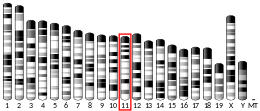GUCY2D
Retinal guanylyl cyclase 1 also known as guanylate cyclase 2D, retinal is an enzyme that in humans is encoded by the GUCY2D (guanylate cyclase 2D) gene.[5]
Function
This gene encodes a retina-specific guanylate cyclase, which is a member of the membrane guanylyl cyclase family. Like other membrane guanylyl cyclases, this enzyme has a hydrophobic amino-terminal signal sequence followed by a large extracellular domain, a single membrane spanning domain, a kinase homology domain, and a guanylyl cyclase catalytic domain. In contrast to other membrane guanylyl cyclases, this enzyme is not activated by natriuretic peptides.
Clinical significance
Mutations in this gene result in Leber's congenital amaurosis and cone-rod dystrophy-6 diseases.[6]
References
- 1 2 3 GRCh38: Ensembl release 89: ENSG00000132518 - Ensembl, May 2017
- 1 2 3 GRCm38: Ensembl release 89: ENSMUSG00000020890 - Ensembl, May 2017
- ↑ "Human PubMed Reference:".
- ↑ "Mouse PubMed Reference:".
- ↑ "Entrez Gene: Guanylate cyclase 2D, membrane (retina-specific)".
- ↑ Perrault I, Rozet JM, Calvas P, Gerber S, Camuzat A, Dollfus H, Châtelin S, Souied E, Ghazi I, Leowski C, Bonnemaison M, Le Paslier D, Frézal J, Dufier JL, Pittler S, Munnich A, Kaplan J (December 1996). "Retinal-specific guanylate cyclase gene mutations in Leber's congenital amaurosis". Nat. Genet. 14 (4): 461–4. doi:10.1038/ng1296-461. PMID 8944027.
This article incorporates text from the United States National Library of Medicine, which is in the public domain.



